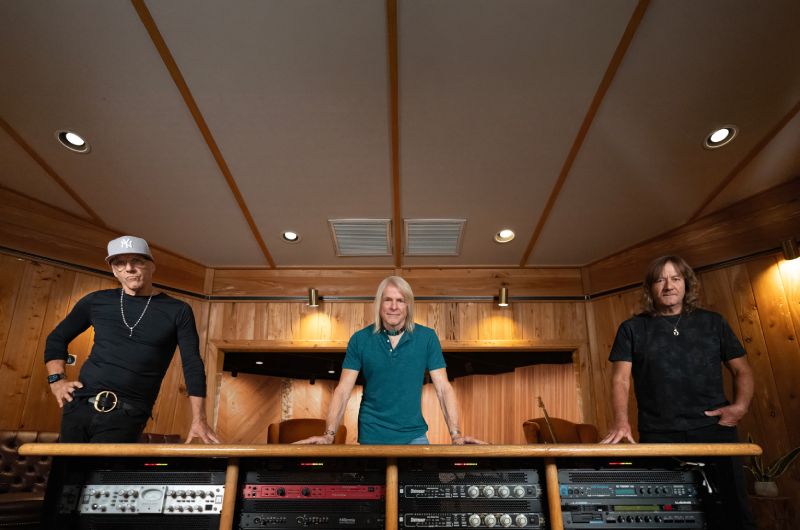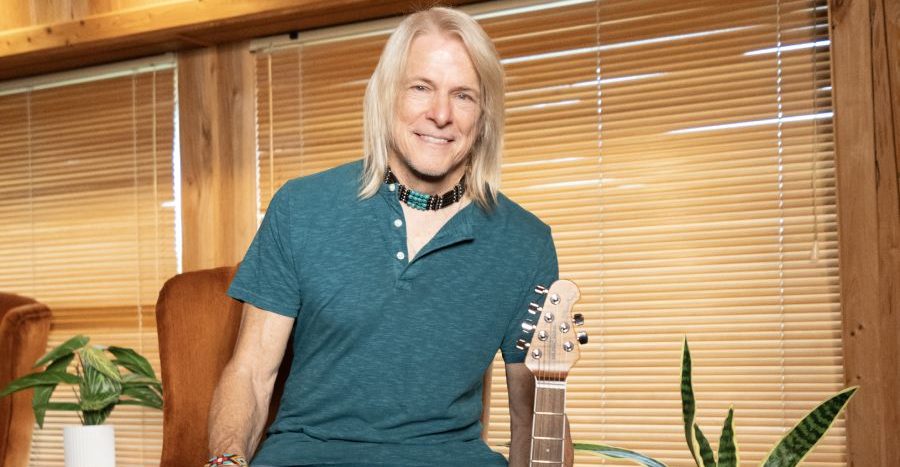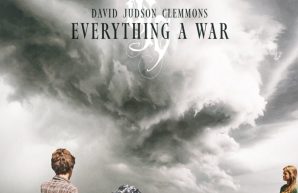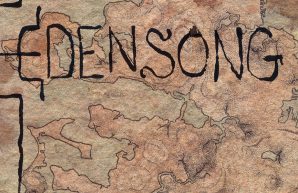Interview by: Mark Lacey
When Steve Morse left Deep Purple in 2022 to care for his wife Janine, who was battling with stage 4 cancer, it marked the end of his tenure as the longest serving guitarist in the band, with 28 years under his belt. Following his wife’s passing in February last year, Steve saw a return to the stage, playing a short run of dates with his former band Dixie Gregs, and now returns with a new album ‘Triangulation’; his first solo recordings since 2009. The music sees a welcome return to Steve’s experimental past and captures many of the emotions of his recent life journey, and a period of self-discovery and reflection.
MyGlobalMind.com caught up with Steve in Raleigh, NC, halfway through his US ‘Triangulation’ tour.
MGM: You’ve had a formidable career, but younger fans may only be familiar with your music through Deep Purple and Flying Colors. Your latest solo album is your first Steve Morse Band album since 2009’s ‘Out Standing in the Field’. ‘Triangulation’ is being released on 14th November, but what does triangulation signify for you?
Steve: The title is a nautical geometric term for solving your position based on the angle of two known points. So, you’re trying to find a solution based on two other things that you can observe. That’s why the album cover has that image of us, one guy stuck and mired down, and then looking toward the others to see how they got where they did in a better position, or how that happened. The other part is that we’re a three-piece band and we depend on each other like the legs of a stool. If you have a four-legged stool, you could possibly get it to balance against a wall or something with one missing. But with three, you can survive more different angles and still be stable. We depend on each other a lot.
MGM: Do you see yourself as one of those three people on the album’s front cover, and if so which one?
Steve: I’m the one on the top which is halfway stuck. Always kind of half in and half out. I always was most of the time because with the number of tours that I did with Purple, we were always gone or about to leave. So, whenever we played as a trio it was in these small gaps and it was hard to build any momentum.
MGM: This is the first album you’ve done under your own name for some time and obviously you’ve had your own personal challenges over the last few years. How would you describe yourself personally and musically at this point in time?
Steve: I think I’m trying to refine my composition and arranging skills more than ever, and trying to find a blend between being a guitarist and a composer. I try to find things that are different that, because they’re played on guitar, are more interesting, but yet have melody and could stand on their own if they were played on another instrument.
MGM: This album feels quite diverse. There are a range of different styles across it and I’m curious as to how that reflects different parts of your personality or your different moods. How would you describe what you’ve tried to do with this musically?

Photos Credit: Nick Nersesov
Steve: Each one is like a painting to me. ‘March of the Nomads’ is one of those literal paintings; I’m imagining a bunch of maybe not native people, trekking centuries ago to find a better place to land. And that fits in today with what’s happening constantly. People have always looked for greener pastures and stuff like that. So, that’s kind of the feel of the tune. And the last tune ‘Taken by an angel’ was a musical painting of the last 12 hours I spent with my wife before she passed. It started in the middle of the night when there was no doubt about the fact that this was happening. The staff had left me alone and kind of eased up for the night because they knew; we actually talked about everything, and it was my vigil. So, it starts with a very lonely, mournful scene and then it picks up a little bit; still very sad as the hospital gets more alive in the morning, and as things get more critical and intense; the music does as well. It builds up to a point where you hear these guitars in the distance; there’s bells ringing, there’s guitars in the distance finally screaming the last cadence before the soft landing; and the faith that there’s a better future for her soul. I guess I’m taking the whole musical painting thing literally.
MGM: Going through the loss of a partner is always going to be a difficult and traumatic time. Was that a difficult musical piece for you to write, or did it feel therapeutic for you?
Steve: Both. It was difficult because I actually had a part of that before; the ending part was something that we had before and actually I had talked Purple into trying it at a gig just for a little interlude, and then it didn’t make sense to anybody. So, we didn’t continue that. But I always thought that that was fitting. I wrote the two earlier parts to complement that.
MGM: You played that piece at your wife’s memorial service, and you did that with your son Kevin. You’ve played together before, but that must have been a quite touching moment to be able to do that together again.
Steve: Yes. We have different musical goals and styles and, he’d played with me as a dad, just like if you worked at an office and your kid wanted to come to the office, you’d have him do something because you want to give him some experience and everything. So, he sat in with us when we were playing and there were some people that attacked him online for it … ‘It must be nice, you only got that because you’re his son’. Of course. If your dad owns a trucking company, you got to sit behind the wheel of a truck in the yard moving things when you’re six years old. It’s not a bad thing, but people made it a bad thing because the internet does that. Because of that, he’s really not wanted to be associated with me musically, but we have a wonderful relationship between us. And that’s been the saving grace. I’m really proud of his writing and arrangement skills and recording performance. He’s a much better performer than I am. There’s a different motivation there. There’s not gigs like there used to be. When we were young, we could go play anywhere. We wouldn’t make much money or any money, but we could find places to play. Now that’s hard.
MGM: There are lots of different styles on this album. It’s very experimental in places and includes lots of funk blues influences on there. One of the things people will notice is the choice of collaborators that you’ve got on this album. You’ve worked with Eric Johnson before and have known him for a very long time, but you also have Dream Theater’s John Petrucci on this album.
Steve: It’s people that I know and I’m close with. That was the big criteria there because I’m pulling a favor. Everybody in the business knows that when you record, you’re pretty much doing it for free. And when you ask somebody to learn a tune and come up with a great solo when they’ve already had an amazing career and they don’t necessarily need one more opportunity to be heard, essentially I was calling in a favor and I really hate to do that. I’m just one of those people that doesn’t like to do it. So, it had to be somebody that I knew would be OK with it. And those guys are the ones that came to mind. I know lots of other incredible players, but these guys, stylistically, you can’t find anybody better at doing that clean and immaculate singing melodic rock than Eric Johnson. And in the sort of prog metal genre there’s nobody better than John Petrucci to me. I don’t see how anybody could be because he covers everything and keeps getting better. I felt like I really had a lot already decided for me. So that’s how they came to be, and of course Kevin was natural. When I heard him play at the memorial, I said, we should record this son, are you up for that? He said, Yeah, I’ll do it. So, that was nice.
MGM: One of the album’s standout tracks is the play on words ‘Tumeni Parts’. It’s an epic song, and over 10 minutes long. Was that intentionally written as one song or did you and Dave LaRue just get carried away?
Steve: I told Dave I had three or four parts and I said, I don’t know what’s going to stay and what’s not going to stay. So, let’s just learn this like it is. And then the next day he would come and I said, I actually have another part. He said, really? And then the next day would come and I said, I can’t help it. This led to another part. Let’s try that, too. It just went on and on. Pretty soon we were at six minutes. And I was like; this is not going to be one of our normal tunes. Before you know it, we were at 8 minutes, then 9, then 10, and then we actually reached 11 minutes. But I did cut something back. I didn’t cut it out; I just cut it back.
MGM: It would be interesting to be the voice inside your head when you’re hearing this stuff and trying to translate it through your fingers. How do you sleep?
Steve: Yeah, that’s a problem. I’m not literally clinically insomniac, but I have a hard time getting sleep.
MGM: You’re working with Dave La Rue and Van Romaine again. These two people are obviously very important to you, both musically as two of your longest standing collaborators, but they’re also lifelong friends.
Steve: Definitely. For 40 years I’ve been working with them, not continuously obviously because of Purple, but we’ve done things together. We travel together; like they were with me in the little airplane that I flew around the United States for many years, and they’ve seen a lot. We’ve been sitting next to each other in rental cars today and they’re extremely pro guys. They’re super talented and they can handle any kind of music.
MGM: Is there anything you can do to surprise each other after so long working together?
Steve: Yeah. Dave and Van both. They’re really good arrangers. So, they help a lot with the music. On ‘Taken by an angel’, I said, ‘Can you give me some tubular bells?’ Van’s like, Tubular bells?’ I said, ‘Yeah, like Mike Oldfield tubular bells, for the chorus, especially on the one that goes up a full step’. And so, he said, ‘Yeah, yeah, I’ll put that in there’. And he did, and he’s a drummer. But he’s got a lot of arranging savvy and he knew which notes to accent on. And Dave’s solos always surprise me, because he does something different each time and it’s amazing. He surprises me in a good way.
MGM: You’re currently doing a short tour through October. This is the first extended run of shows that you’ve done since you departed Deep Purple in 2022. How does it feel to be back out there?
Steve: Well, we previously did a Dixie Dregs reunion fun tour with no album, but it’s wonderful to be back in a comfortable setting even if you’re doing something very challenging. But the comfortable setting is being with my friends and knowing that they do have my back. Everybody works together, and everybody’s just kind of aware of each other and helping each other out.
MGM: This music feels very experimental, but does that give you the freedom to experiment when you’re playing live on stage or do you have stick to a core structure when you’re playing these songs live?

Photos Credit: Nick Nersesov
Steve: No, we don’t improvise except maybe on the solo sections and we have two sections of improv on one of the tunes. It’s a stretch out tune, but most of them are performed like we recorded it. In fact, we have an extra guitarist on this tour to help facilitate that because some of the songs on the new album are duets like the one with John Petrucci and Eric Johnson.
MGM: What’s the name of your 2nd guitar player on this tour?
Steve: His stage name is Angel Vivaldi, and he can play any style. He’s a videographer as well. He’s one of those social media savants. He’s a very versatile guy.
MGM: This tour runs to the end of the month, so in comparison to some of your previous tours, it’s quite a short run. Do you see room for doing more shows either around broader parts of America or across Europe and the UK?
Steve: Yes, there’s a possibility but at the same time, we’re going to look and rethink what we’re doing because this tour got thrown together real quickly and there’s been some changes in the way that music is perceived by the public; live shows and things like that. I don’t know if live music is as important to people as it used to be, but it’s gratifying to have people coming out and making the vibe of the shows fun. So, that part hasn’t changed. It’s just now that I have to do so much stuff other than music in order to have people at the shows, and I don’t know if I want a full time job doing promotion. It’s not just go play the show anymore. I have a full life in addition to music, so I don’t know what I’m going to do.
MGM: Speaking of your full life outside of music, what you do in your spare time when you’re not playing guitar?
Steve: I live on a hay farm, and I do everything myself. No help. So, I cut the baled hay, put it up, and I just finished doing that before this tour, but I didn’t get enough bales because I had to repair the twine baler, the big brown baler. I got the main bearing in and all that stuff, but it cost me time, so I didn’t get enough cut. So, I have to cut some more. And I also fly planes. So, I’m in charge of ordering parts for the planes and keeping them going. I work with a mechanic. I’m an airplane mechanic myself, but I work with another mechanic for another set of eyes, and he does the inspections and approvals.
MGM: Hay baling sounds like hard work. It’ll certainly keep you fit.
Steve: I do stay busy, and I have two households. My mum passed away during covid and my wife’s mother lives on the property in a different home too. So, I’ve got three homes to keep track of. There’s a lot of things going on. I just don’t have as much time as some people do, and I don’t crave social media work. If it happens naturally, that’s cool.
MGM: Hopefully you’ll come across the UK and Europe with your solo music. But one question many people will want to know the answer to is whether you can see a time when you’ll perform with Deep Purple again, even if it was just for a one-off performance. Can you see that happening?
Steve: Anything’s possible, but they’re in good hands with Simon. He’s great for them. He’s a wonderful player, and that’s really what I think some of them wanted; having that British sound and validity that he gives them. He’s inventive as well but I think it’s a better fit for them. I think it would just be for the benefit of getting clicks or something if we did do anything. You can imagine the headlines.
‘Triangulation’ is out on the 14th November through Mascot Records
For more information: www.stevemorseofficial.com








